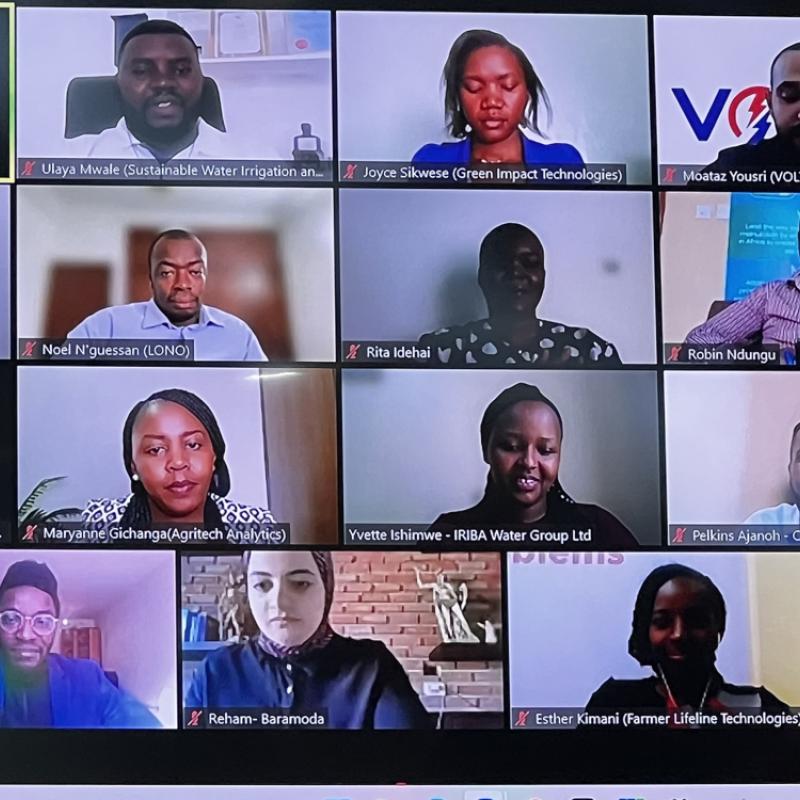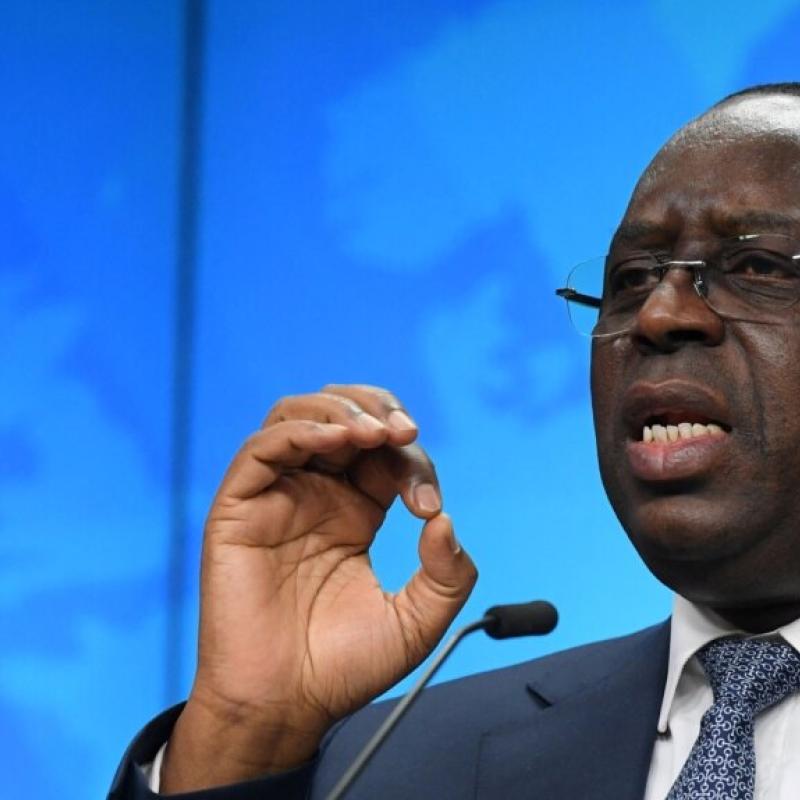
AAAP in the Media
Displaying 1 - 12 of 23
Can today’s Adaptation Action minimize future losses and damages in Africa?
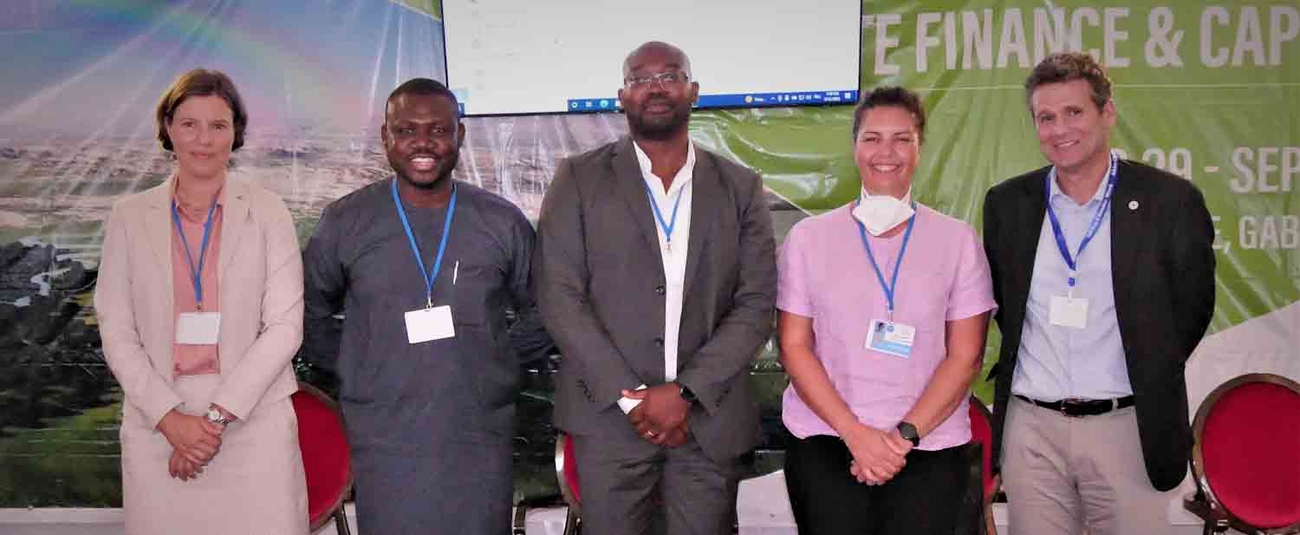
On the sidelines of the 2022 edition of Africa Climate Week(link is external), a session titled Limiting Loss and Damage through Enhanced Adaptation Action in Africa featured vibrant and timely discussion of an aspect of climate change that typically receives little attention: capturing and assessing the costs and damages associated with climate change.
The African Development Bank and Germany’s Konrad Adenauer Foundation hosted the event, which provided a forum for panelists and participants to discuss the importance of defining and evaluating such losses and damages of properties, economies, lives and livelihoods due to climate disasters. Africa is acknowledged to be the continent most vulnerable to climate change.
Moderator Olufunso Somorin, a Regional Principal Officer at the African Development Bank, opened the discussion. He pointed out that it is important for African countries to measure climate-change related loss and damage to enable appropriate quantification and well-designed responses best suited to country context. It was also important to capture those losses occurred even in instances where preventive climate adaptation actions had been taken, he added.
Fatten Agad, Africa Climate Foundation’s Senior Advisor on Climate Diplomacy and Geopolitics, called for production of a report that would serve as guidance and baseline for evaluating climate related losses and damage. “It has already been demonstrated that the socio-economic impact faced by African countries in coping with the Covid-19 crisis has been very high, and adding a burden of financing something such as loss and damage would be unfair,” she said.
Anja Beretta, Konrad Adenauer’s Director for Energy Security and Climate Change in Africa, urged African countries to integrate mechanisms to address losses and damage into their Nationally Determined Contributions (NDCs). She also called for designated institutions and functioning structures to ensure the efficient and effective use of climate finance to advance the discussion on financial flows into loss and damage.
Stephane Bonamy, Head of the Regional Delegation for the International Committee of the Red Cross in Cameroon, said, for countries that face both conflict and climate change impacts, it is imperative that preventive measures are put in place early enough to reduce the extent of loss and damage faced and lessen the burden on communities.” He noted that 14 of the 25 most vulnerable countries to climate change impacts worldwide also face some form of conflict.
Dr Olumide Abimbola, the Executive Director of the Africa Policy Research Institute in Berlin reiterated the need for more African examples of past and current loss and damage to be incorporated into textbooks and journals.
There was agreement among the participants on the need for Africa to prioritize timely, comprehensive and large-scale adaptation action to avert or minimize future losses and damages.
There was also consensus on the urgent need to scale up financial flows from public and private sources into adaptation action across Africa. They cited the African Development Bank’s Africa Adaptation Acceleration Program, a joint initiative with the Global Center on Adaptation, as a positive example. The program seeks to mobilize $25 billion over five years to accelerate and scale climate adaptation actions across the continent.
Participants also called for new strategic partnerships to drive adaptation policies, plans and investments in Africa through the implementation of NDCs and tapping synergies with such initiatives as the Africa Disaster Risk Financing program.
About the African Climate Week (ACW)
ACW is an annual event that engages and empowers stakeholders to drive climate action across countries, communities and economies. The event is organized by UN Climate Change in collaboration with global partners UN Development Programme, UN Environment Programme and the World Bank Group. Partners in the region include the Africa Union, the Africa Development Bank, the UN Economic Commission for Africa (UNECA). ACW 2022 was hosted in Gabon.
Africa Adaptation Dialogue: implementing the vision at the Africa Climate Week
What: Africa Adaptation Dialogue: implementing the vision
When: 31 August 09:30 - 10:30 CAT
Where: Libreville, Gabon
Who: Global Center on Adaptation; Africa Adaptation Initiative (Chaired by Gabon); African Development Bank
Despite contributing the least to global warming, Africa finds itself on the frontline of the climate emergency, with the impacts of external shocks exacerbating these vulnerabilities. Indeed, large portions of Africa—particularly the drylands that cover three-fifths of the continent—are warming at a rate twice the global average, putting half a billion people at risk.
Chaired by Gabon, the Africa Adaptation Initiative (AAI) aims to strengthen collaboration on adaptation across the continent. To implement this vision, the Global Center on Adaptation and the African Development Bank have jointly developed the Africa Adaptation Acceleration Program – AAAP. This Africa-led, Africa-owned response is mobilizing $25 billion for climate adaptation investments in the continent over five years. This event will review progress of the AAAP and how it is contributing to narrowing the finance gap, thus accelerating the implementation of AAI.
Program
- Welcome Remarks by the Moderator
Davinah Milenge Uwella – Principal Programme Coordinator, African Development Bank
- Opening Video
- Opening Remarks
Dr. Kevin Kariuki – Vice President, Power, Energy, Climate Change and Green Growth, AfDB
- Framing remarks: The Africa Adaptation Initiative and the AAA
Tanguy Gahouma-Bekale – Special Advisor to His Excellency Ali Bongo Ondimba, President of the Gabonese Republic, Permanent Secretary of the National Climate Council
- The AAAP as the vehicle to implement the AAI vision
Prof. Anthony Nyong – Senior Director, and Africa Regional Director, Global Center on Adaptation
AAAP voices from the field
- AAAP partners and beneficiaries
Moderated discussion with participants
- Wrap up by the Moderator
Multi-Stakeholder Dialogue on Climate Risk Assessment and adaptation options prioritization for the Transgabonaise road corridor PPP project
What: This is a private event
Where: Global - Virtual
When: 19 April 2023, 0:00
This first Multi-Stakeholder Climate Risk Dialogue will present the preliminary results of the high-resolution climate hazard modelling outcomes, and vulnerability assessment of the road corridor project.
Event description:
As part of the Global Center on Adaptation’s support to the Transgabonaise road corridor project under the Africa Adaptation Acceleration Program (AAAP), a Multi-Stakeholder Climate Risk Dialogue was organized to present results from the climate risk assessment with the African Development Bank, and project partners including the Societe Autiroutiere du Gabon (SAG), and the government of Gabon’s departments of Environment, Weather, and transport.
Historical weather trends, in Gabon, show an increase in mean annual temperatures of +1ºC since 1981, and decrease in mean annual rainfall, at an average rate of 3.8 mm per month per decade since 1960, with regional disparities. The technical assistance provided by the GCA will support an in-depth understanding of future climate hazards under different climate change scenarios, and across the different regions crossed by the 900km road corridor, and led to identify and provide a cost-benefit analysis of adaptation and resilience options to mitigate these current and future climate hazards.
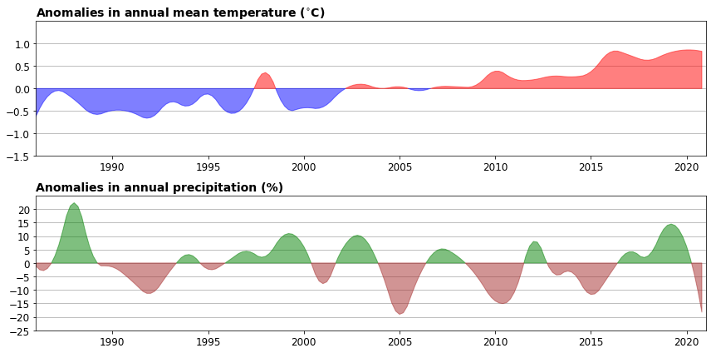
Figure 1: Climatology in Gabon: Historic evolution and trends, Source GCA – study from Royal Haskoning, Lobelia Earth, April 2023.
This First Multi-Stakeholder Climate Risk Dialogue will present the preliminary results of the high-resolution climate hazard modelling outcomes, and vulnerability assessment of the road corridor project. Especially, the project stakeholders will discuss the main climate hazards that have been highlighted, including extreme temperatures, extreme precipitation, drought intensity, and how these climate events might impact the assets and transport services. The discussion with local stakeholders will contribute to ensure robustness of the project outcomes.
Africa Adaptation Dialogue: implementing the vision
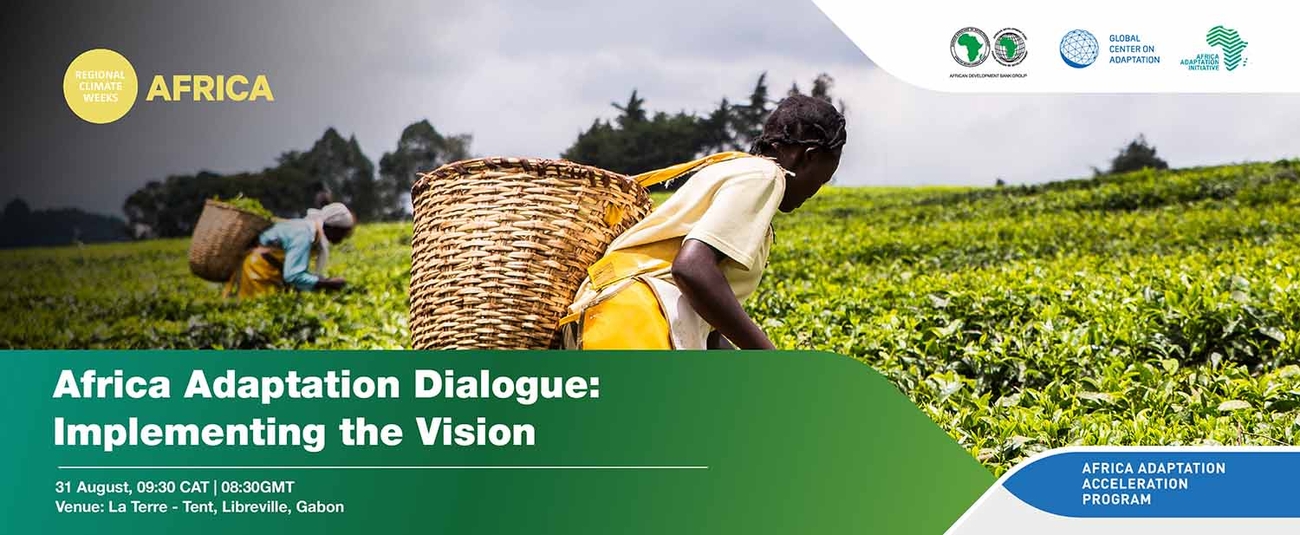
What: Africa Adaptation Dialogue: implementing the vision
When: 31 August 09:30 - 10:30 CAT
Where: Libreville, Gabon
Who: Global Center on Adaptation; Africa Adaptation Initiative (Chaired by Gabon); African Development Bank
Despite contributing the least to global warming, Africa finds itself on the frontline of the climate emergency, with the impacts of external shocks exacerbating these vulnerabilities. Indeed, large portions of Africa—particularly the drylands that cover three-fifths of the continent—are warming at a rate twice the global average, putting half a billion people at risk.
Chaired by Gabon, the Africa Adaptation Initiative (AAI) aims to strengthen collaboration on adaptation across the continent. To implement this vision, the Global Center on Adaptation and the African Development Bank have jointly developed the Africa Adaptation Acceleration Program – AAAP. This Africa-led, Africa-owned response is mobilizing $25 billion for climate adaptation investments in the continent over five years. This event will review progress of the AAAP and how it is contributing to narrowing the finance gap, thus accelerating the implementation of AAI.
Program
- Welcome Remarks by the Moderator
Davinah Milenge Uwella – Principal Programme Coordinator, African Development Bank
- Opening Video
- Opening Remarks
Dr. Kevin Kariuki – Vice President, Power, Energy, Climate Change and Green Growth, AfDB
- Framing remarks: The Africa Adaptation Initiative and the AAA
Tanguy Gahouma-Bekale – Special Advisor to His Excellency Ali Bongo Ondimba, President of the Gabonese Republic, Permanent Secretary of the National Climate Council
- The AAAP as the vehicle to implement the AAI vision
Prof. Anthony Nyong – Senior Director, and Africa Regional Director, Global Center on Adaptation
AAAP voices from the field
- AAAP partners and beneficiaries
Moderated discussion with participants
- Wrap up by the Moderator
Gabon –The Transgabonaise Road Project
With improvements to the road, rail, shipping and aviation networks a key government goal, Gabon’s transport sector is undergoing a major transformation. While population pressure is modest, with around 1.7m people in the country, existing links are limited; the two largest cities, Libreville and Port-Gentil, had, until work began on one recently, no road connection.
The 828 km long Transgabonaise road is key as it connects Libreville (the capital and coastal city) and Franceville (third Gabonese city after Port-Gentil). It comprises several segments of the Routes Nationales (RN) 1 to 4. Despite its strategic importance, the road has suffered from substantial deterioration due to a lack of maintenance and increased traffic over the last decade, caused by the increase of population and lumbering.
The projects is supporting the rehabilitation of a succession of national roads in Gabon to make it a more efficient logistics axis.
Transgabonaise Road Project is divided into three stages:
- Libreville -AlembéStage
- Alembé -Mikouyi (via Lalara, Koumameyong, Booué, Carrefour Leroy)
- Mikouyi -Franceville
- High-resolution, asset-level climate risk and vulnerability assessments to quantify key climate hazards and associated risks to the road infrastructure assets along the entire road corridor
- Innovative solutions for climate smart transport asset management: Based on specific hazards identified including nature-based solutions (NBS) to optimize the resilience of the assets
- Operational performance metrics and standards for the service level agreement (SLA) based on the direct and indirect climate-related damages identified
- Improvement in the capacity and quality of the road infrastructure
- Creation of over 1,000 direct jobs and over 9,000 indirect jobs
- Saving on operational costs and travel time impacting both households and private sector development though lower transport costs
- Generation of safety benefits and lower greenhouse gas emissions
- Additional 200 billion CFA (or $302.4 million) to Gabon’s GDP (equivalent to ~1.9% according to the 2021 GDP)
- Increased connectivity within Gabon and with neighboring countries such as Cameroon, Equatorial Guinea and Congo-Brazzaville
- Promote economic growth through ease of transportation of goods and services efficiently, allowing businesses to access larger markets and expand their operations
- increased trade, investment, and tourism, stimulating economic development in both urban and rural areas in Gabon
- Enhances regional integration and cooperation by facilitating the movement of people, goods, and services across borders, fostering trade relationships and cultural exchange
- Improve accessibility to remote areas, providing people with better opportunities for education, healthcare, employment, and social services
USD 99.2 million
Ghana: Roadmap for Resilient Infrastructure in a Changing Climate
The preparation of this resilient infrastructure roadmap has benefited greatly from the expertise provided by the Government of Ghana through its Technical Working Group for this study. This group comprised experts and stakeholders across a wide range of professions, knowledge and practice communities who participated in consultations, meetings, and workshops, while providing the data and information required to achieve this final output.
Climate risk regulation in Africa’s financial sector and related private sector initiatives
Extreme weather phenomena such as rising temperatures and the increasing frequency of droughts and floods are affecting lives and livelihoods in Africa. According to the Global Climate Risk Index 2021,1 five African countries ranked among the 10 countries most affected by extreme weather in 2019: Mozambique (first), Zimbabwe (second), Malawi (fifth), South Sudan (eighth), and Niger (ninth).
AAAP strategic support to Ghana
Ghana is vulnerable to increasing aridity, droughts and extreme rainfall events and flooding , and faces significant challenges from a changing climate to its ecology, economy, and society. In addition, Ghana has a high degree of risk to natural hazards and disasters. The country is exposed to risks from multiple weather-related hazards, primarily those due to floods and droughts in the Northern Savannah belt. There are also risks related to coastal resources, including storm surges and coastal erosion as well as landslides, earthquakes, pest infestations, and wildfires. Between 1991 and 2011 the country experienced seven major floods. In 2010, floods in the White Volta River Basin affected hundreds of thousands of people and destroyed many of their livelihoods. Urban floods also regularly impact major cities. Current development dynamics and demographic changes in Ghana further compound the risk of disasters. These dynamics are related to rural poverty, rapid urbanization, and environmental degradation. Agriculture and livestock, two sectors most impacted by weatherrelated hazards, constitute the foundation of Ghana’s economy and employ 55% of the economically active population . Climate change and variability are already affecting Ghana’s water resources with damage and flood exposure projected to result in $160 million annually.
African and other global leaders meeting in Rotterdam say the continent is at a tipping point for climate adaptation action
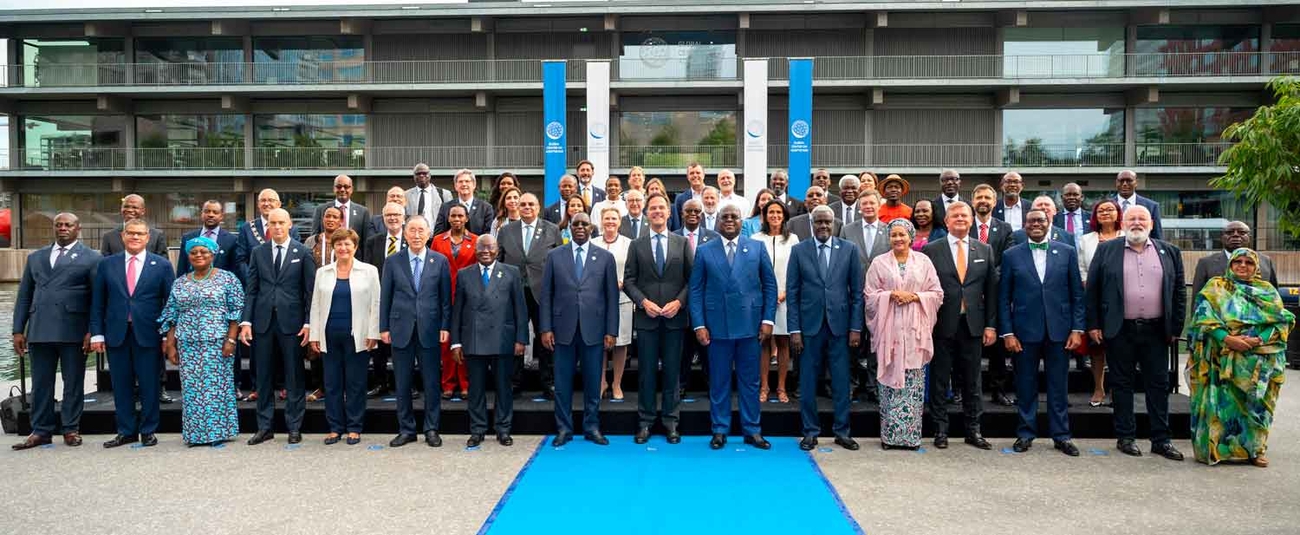
Two months to the 27th global climate summit (COP27) in Sharm El-Sheik, Egypt, African and other global leaders have rallied in Rotterdam, to highlight the urgency of climate adaptation funding for the continent.
The meetings—co-convened by the President of the African Development Bank Group Dr Akinwumi Adesina, CEO of the Global Center on Adaptation (GCA) Professor Patrick Verkooijen, and African Union Commission Chair Mousa Faki Mahamat—was unanimous about the need for concrete action and finance.
Former UN Secretary General Ban Ki-moon and GCA Co-Chair said: “The world has a fever. It burns hotter and higher with every day that passes… Statistics tell us that Africa is where the fever is at its most intense and people at the most vulnerable.”
GCA Co-Chair and Honorary Chairman of Royal DSM Feike Sijbesma spoke about the importance of support from the global private sector. He said 80% of the funding for adaptation needs to come from the private sector in both the developed north and the developing south.
GCA Chief Executive Officer Patrick Verkooijen emphasized the disastrous impacts of climate change hitting all parts of the world. He said it is in Africa, however, that climate shocks will hit the hardest. He said Africa was resolute about its economic advancement and would not stop. “Adaptation in Africa is like climbing a mountain. With all of you here today, we have the dream team that will climb the mountain together.”
Verkooijen added: “The next summit after today is Sharm El-Sheikh, the Africa COP. But success in Egypt will hinge on whether Africa’s needs are met or not. Africa has the commitment and the plan. That plan is the Africa Adaptation Acceleration Program (AAA-P). It is Africa-developed and Africa-owned. It was launched by Africa’s leaders, who are here today. It is the vehicle for delivering the Africa Adaptation Initiative.”
Established in 2020 by the GCA and the African Development Bank, the Africa Adaptation Acceleration Program lies at the center of climate action on the African continent. Participants acknowledged Verkooijen’s and Adesina’s joint efforts as the driving forces behind the program.
African Union Chairperson, President Macky Sall of Senegal, President Nana Akufo-Addo of Ghana, who is Chair of the Climate Vulnerable Forum, and President Felix Tshisekedi of the Democratic of the Congo conveyed a unified message: the international community must deliver on its pledge to double adaptation finance and to scale adaptation action for Africa.
President Sall expressed disappointment at the absence of industrialized country leaders at the summit. The African Union Chair said if African leaders could be in Rotterdam in person to discuss such a crucial issue as climate adaptation in Africa, the very least they expected was that their European counterparts—whose countries are among the world’s biggest polluters—would also have been present at the summit.
This sentiment was shared by Presidents Akufo-Addo and Tshisekedi, African Union Commission Chairperson Moussa Faki Mahamat and UN Deputy Secretary General Amina Mohammed, among others. Mohammed said: “A bird only flies with two wings, and the representation at this table is lopsided.”
The UN deputy chief added that it was not Africa’s fault that it is in its current position, given that it contributes very little to global carbon emissions. She pondered on what the situation would have been if the roles had been reversed. Mohammed said the COP26 Glasgow pact was at risk of failing if the developed world did not make good on its promises of delivering $100 billion a year for climate action in developing countries.
In his intervention(link is external), Adesina reminded participants that the African continent was warming faster than any other region of the world, as predictions from the Intergovernmental Panel on Climate Change show that the critical global warming levels will be reached much earlier in Africa.
The African Development Bank chief explained that in the face of the deluge, Africa does not have the resources to tackle climate change. He said the continent receives only 3% of global climate financing. He noted that if this trend continued, Africa’s climate financing gap could reach between $100 billion to $127 billion per year through 2030.
Adesina said: “The current climate financing architecture is not meeting the needs of Africa. New estimates by the African Economic Outlook of the African Development Bank show that Africa will need between 1.3 and 1.6 trillion dollars from 2020 to 2030, or $118 billion to $145 billion annually to implement its commitments to the Paris Agreement and its nationally determined contributions.”
The African Development Bank chief said the African Adaptation Acceleration Program’s upstream facility at the GCA had already helped to generate $3 billion of mainstreamed climate adaptation investments by the African Development Bank, from agriculture to energy, transport, water, and sanitation.
Adesina spoke of the African Development Bank’s African Development Fund (ADF), its concessionary lending arm as one of the ways to address the climate financing gap. He said the 16th replenishment of the fund, currently underway, presented a unique opportunity for full financing of the $12.5 billion in financing for the Africa Adaptation Acceleration Program.
The African Development Bank chief explained that the African Development Fund had introduced a Climate Action Window that would hopefully mobilize $4 billion to $13 billion for climate adaptation for the Fund’s member countries. “This will be used to support 20 million farmers with access to climate resilient agricultural technologies, access of 20 million farmers and pastoralists to weather-indexed crop insurance, reviving 1 million hectares of degraded land, and provision of renewable energy for about 9.5 million people.
Adesina said commitments by developed countries to provide $100 billion annually in climate finance for developing countries was long overdue. “Africa cannot wait,” he emphasized. “This is the time to support the Africa Adaptation Acceleration Program. This is the time to support the ADF 16th replenishment. This is the time to support the Climate Action Window of ADF-16.”
World Trade Organization Director General Ngozi Okonjo-Iweala also lent her voice to the clarion call for additional resources for Africa adaptation funding. Speaking about the role of trade in climate adaptation, she said trade policies should be integrated into global climate action as an amplifying force for financing and other climate-related support provided to vulnerable economies.
The summit’s five-point Communique(link is external) highlighted that Africa was at a tipping point. It emphasized that success at COP27 will depend on whether the needs of Africa, the world’s most climate-vulnerable continent, are met with finance flowing into such key country-led adaptation programs as the Africa Adaptation Acceleration Program.
GCA Co-Chair Feike Sijbesma said in closing: “Investments in global climate adaptation cooperation are a big opportunity for countries like the Netherlands to share some of our best innovations with those who need them the most. The AAAP will be a crucial vehicle for triggering far greater business investment across Africa into green and resilient solutions. This is a collective effort, we need every sector, every contribution possible to see off the climate crisis in Africa, and the private sector, in particular, has a massive role to play.”

